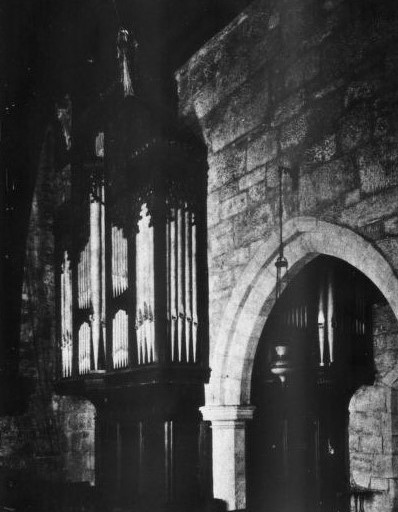
1928-02-01 - Contemporary image of case, published in The American Organist, p. 2 (Photograph from an archival source: The American Organist, February 1928, submitted by Paul R. Marchesano/Paul R. Marchesano)

2013-04-09 - A new organ at the time of installation. -- Alan Swartz identified the organ through information in <em>A Brief History and Guide to the Church of Saint James the Less,</em> written in 1983 by Paul W. Kayser. From page 14:<br>"The Organ was built by Hillgreen, Lane and Co. of Alliance, Ohio under the direction of Gustav Doring, former Director of Gifts for the Carnegie Foundation. The case of oak surmounted by two polychrome angels was designed by Wilfred Edwards Anthony; it was built by William F. Ross of Boston." (James Cook. 2013-04-09) -Database Manager
2013-12-20 - Updated through online information from John McCraney. -- Information from the AMERICAN ORGANIST, February 1928, pages 69-71 & photos -Database Manager
Stoplist and other information from the AMERICAN ORGANIST, February 1928 Source: Source not recorded Date not recorded
Philadelphia, Pennsylvania
St. James-the-Less Episcopal Church
Hillgreen-Lane & Company [no opus number given]
Memorial to William W. Harding and Catharine [spelling in TAO] B. Harding
Given by Mr. J. Horace Harding
2 Dedicatory Recitals (different selections for each) by Lynnwood Farnam November 23
"...playing in the afternoon to those who constituted the musical elite, and
in the evening to those whose tastes required a sweetened diet."
Specifications by Mr. G. F. Dohring
16 V 17 R. 20 Stops 1118 Pipes Manuals 61 notes Pedal 32 notes, radiating/concave
GREAT 4 /2 Inch Wind SWELL 3 1/2 Inch Wind PEDAL 4 1/2 Inch Wind
8 Diapason 73 16 Viol 85 16 Diapason 44 wood
8 Dulciana 73 8 Diapason 73 16 Dolce 32 wood/metal
8 Quintone 73 8 Viol (from 16) 16 Bourdon 32
8 Melodia 73 8 Celeste 61 8 Diapason (from 16)
4 Flute 73 8 Dolce Celeste 2 Rks. 134 8 Violoncello (from Sw. Viol)
8 French 8 Stopped Flute 73
Horn 73 4 Viol (from 16)
Tremulant 4 Harmonic Flute 73
8 Oboe 73
Tremulant
COUPLERS (exactly in this format in magazine):
To Ped. Gt. Sw.
4' S GS S
8' GS GS GS
16' GS S
PISTONS 4 GP 4 SP 4 TUTTI [Generals ?]
CRESCENDOS G and P S and P Register
G-P Reversible
2 h. p. Orgoblo
[Caveat: TAO used the same stop name for extensions from a single rank, but the actual stop control
might have a different name for each derived pitch]
ADDITIONAL INFORMATION
TAO Photos: Cover--Exterior of Church
Full Two-Page Hillgreen Advertisement,
Left Page showing west end of nave with organ case against the north wall
and the console opposite and facing the case
Page 44--Better, almost full-page photo of the case facing the nave the portion facing the back
of a side aisle (the organ is in a bay); this photo with description was oincluded in
several editions of William Barnes' THE CONTEMPORARY AMERICAN ORGAN
Page 68--article entitled "The Small Organ in Excelsis" prints the stoplist above
Page 71--Large photo of console
The Church Itself--It is in what was once a suburban setting on a gentle hillside with a graveyard
surrounding all sides; excellent medieval revival tombstones. At the foot of the
slope is the Wannamaker tower. The church itself is built as a replica of an English
country church, with plans being supplied by the Ecclesiastical Society and described
in its publication THE ECCLESIOLOGIST.
The church is quite small, although it appears larger because of the high nave. It is largely
unaltered except for the substitution of an outstanding brass rood screen that replaces the
original wooden one and Pre-Raphaelite paintings on the chancel ceiling. Although the building
is solid stone and other surfaces are wood, it is dead acoustically.
It is well worth a visit (I attended church there in the 1980s, and the organ was being used).
A few years ago, the congregation wanted to leave the Episcopal Church, but the bishop
prevailed. From the present web site, it seems the church/diocese maintains a school and uses
the church edifice for chapel.
There are several web sites about the early and recent history of the building as well as a site
with photos of both the exterior and the interior of the building throughout its history.
I would recommend looking uo 'St. James-the-Less Philadelphia" and going to Images on Yahoo
and follow those links.
The church building was the subject of an extensive illustrated article in the Episcopal
Church's historical magazine (sometime before the early 1980s), and it has another write-up in
Phoebe B. Stanton's THE GOTHIC REVIVAL & AMERICAN CHURCH ARCHITECTURE: AN EPISODE IN TASTE
1840-1856 (my copy is from Amazon). There is also a section on St. Mark's, Philadelphia.
[Received from John McCraney 2013-12-17.]Regrettably, it is not possible to display the information about the sponsor of this pipeorgandatabase entry or if there is a sponsor. Please see About Sponsors on Pipe Organ Database.